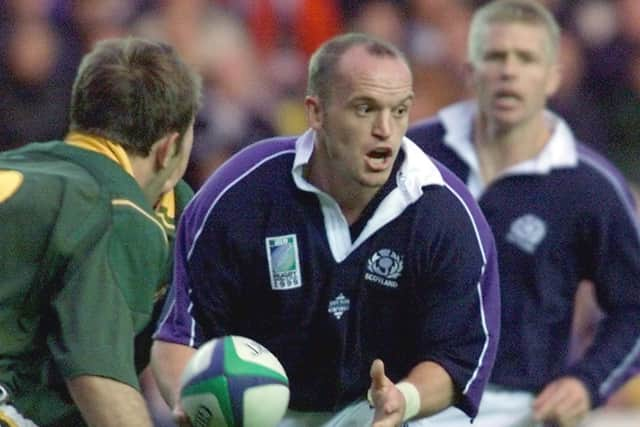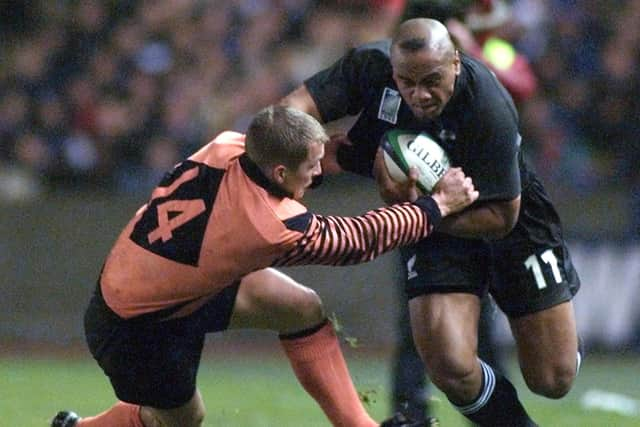Scotland at the 1999 Rugby World Cup - supporter apathy as Murrayfield hosted Springboks and All Blacks


This meant that all Scotland’s games were played at Murrayfield. As winners of the Five Nations title that Spring, their last match in that tournament being the splendid 36-22 win in Paris, there was more reason for optimism than has usually been the case. However, it was tempered by the thought that the first Pool game was against the holders, South Africa.
Given that we lost 29-46, doubters were justified, but in fact the match was much closer than the final score suggests and in fact we led 18-13 at half-time. South Africa went into the lead soon afterwards, and Scottish homes dimmed when our New Zealand-born centre John Leslie was injured in scoring what looked to the naked (partisan) eye like a try and had to leave the field, being replaced by Edinburgh’s Jamie Mayer. South Africa surged ahead and a try by Alan Tait, converted by Kenny Logan, and a Gregor Townsend drop-goal were not enough. In fairness one should say that the last Springbok tries came in injury time, and the final score somewhat flattered them.
Advertisement
Hide AdAdvertisement
Hide AdThis defeat made it all but certain that we would face New Zealand in the quarter-final. Still we won the remaining pool matches against Uruguay and Spain very easily, the disappointment following the defeat by South Africa being reflected in miserable crowds at Murrayfield, and even the quarter-final play-off match against Samoa, played admittedly on a Wednesday afternoon, attracted only about 15,500, leaving the stadium three-quarters empty. It was, despite this apathy, won 35-20.


And now for New Zealand. The All Blacks were favourites for the Cup. The game was played on the Saturday evening before a crowd of just under 50,000, still not near a full-house. In the afternoon we had watched South Africa beat England, a match made remarkable by the Springbok fly-half, Jannie De Beer kicking five drop goals, one from way-out on the right touchline. There have been fly-halves since who haven't dropped as many goals in a lengthy international career.
It was a cool damp evening in Edinburgh, but the match was a good one. Scotland’s best performance of the tournament, even though we never came close to winning. It could indeed be said that the match was effectively won in the first quarter as New Zealand went 17-0 up. At half-time the score was 25-3. And, even though Scotland hadn’t played badly, they seemed on the way to a heavy drubbing. Instead Scotland rallied admirably. Townsend dropped a goal, and though the mighty Jonah Lomu scored an unconverted try to make it 30-6, the last 20 minutes belonged to Scotland, with tries by Budge Pountny and right-wing Cammie Murray. So the second half was won 15-5, not enough of course, and some said “only the old consolation scores”. Fair enough. Yet when in the semi-final France came from well-behind, scoring tries from depth to beat the All Blacks 43-31, one couldn’t help wondering what might have been, all the more so since it was only six months since we had defeated France in such fine style. Tears over spilled milk of course.
World Cups mark the end of some careers. 1999 saw the retirement of the last two members of the 1990 Grand Slam still playing – Gary Armstrong and Paul Burnell – and also of Alan Tait, to my mind the best Scottish centre of the eighties and nineties, whose Scotland career beginning in New Zealand in 1987 had been interrupted by his move to Rugby League. If the Union game’s move to professionalism had brought Tait back to the Scotland team, it had also reinvigorated Armstrong’s career. Injuries and the difficulty of juggling work, family and rugby had seen him out of the Scotland team and he missed the 1995 World Cup. Professionalism saw him move from Jed-Forest to Newcastle where his game flowered and, important, his passing improved. The Gary of the 1990 Grand Slam had been a very fine player; the Gary of 1999 was indisputably a great one. As for Paul Burnell, he had been a reliable tight-head prop going about his business effectively and reliably. Few immediate opponents had the better of him.
Comments
Want to join the conversation? Please or to comment on this article.